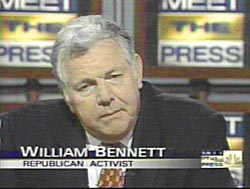William Bennett 

William John Bennett (born July 31, 1943) is an American politician. He served as United States Secretary of Education from 1985 to 1988. He also held the post of Director of the Office of National Drug Control Policy (or "Drug Czar") under George H. W. Bush.
Bennett was born in Brooklyn but later moved to Washington, DC, where he attended Gonzaga College High School. He graduated from Williams College and went on to get a PhD from the University of Texas at Austin in Political Philosophy. He also has a law degree from Harvard Law School.
From 1976 to 1981, he was the executive director of the National Humanities Center, a private research facility in North Carolina. In 1981, President Ronald Reagan appointed him to head the National Endowment for the Humanities, where he served until Reagan appointed him Secretary of Education in 1985. Bennett resigned from this post in 1988 and, later that year, was appointed to the post of Director of the Office of National Drug Control Policy by President Bush. He was confirmed by the Senate in a 97-2 vote.
He was co-director of Empower America and was a Distinguished Fellow in Cultural Policy Studies at the Heritage Foundation. Long active in United States Republican Party politics, he is now an author, speaker, and, since April 5, 2004, the host of the weekday radio program Morning in America on the Dallas, Texas-based Salem Communications. In addition to his radio show, he is the Washington Fellow of the Claremont Institute.
Bennett and his wife, Elayne, have two sons, John and Joseph. His wife Elayne is the President and Founder of Best Friends Foundation,a nationwide abstinence-based program for adolescents. He is the brother of prominent Washington attorney Robert S. Bennett.
Political Viewpoints
Bennett tends to take a conservative position on affirmative action, school vouchers, curriculum reform, and religion in education. As Education Secretary, he asked colleges to better enforce drug laws, supported a classical education rooted in Western culture, and derided multicultural courses. He frequently criticized schools for low standards. In fact, in 1988, he called the Chicago public school system "the worst in the nation."
Bennett has tangled with the educational establishment (which he dubbed "the blob" or bloated educational bureaucracy) over the following reform measures, which he espoused:
Competency testing for teachers
Opening the teaching profession to knowledgeable individuals who have not graduated from "schools of education"
Performance-based pay
Holding educators accountable for how much children learn
An end to tenure
A national examination to find out exactly how much our children know
Parental choice of schools (The De-Valuing Of America, page 44)
Bennett is a staunch supporter of the War on Drugs and has been criticized for his extreme views on the issue. On a television show, he said that a viewer's suggestion of beheading drug dealers would be 'morally plausible'.
Bennett is a staunch critic of Same-Sex Marriage.
In 1995, he teamed up with C. Delores Tucker to create advertising to target Time Warner's lack of regulation of gangsta rap and its glorifcation of violence and denigration of women. Bennett is a member of the Project for the New American Century (PNAC) and was one of the signers of the January 26, 1998 PNAC Letter sent to President Bill Clinton urging Clinton to remove Iraqi leader Saddam Hussein from power.
Books
Bennett's best-known written work may be The Book of Virtues: A Treasury of Great Moral Stories (1993), which he edited; he has also authored and edited ten other books, including The Children’s Book of Virtues and The Death of Outrage: Bill Clinton and the Assault on American Ideals (1998).
Other books:
America: The Last Best Hope (Volume I): From the Age of Discovery to a World at War (2006)
Why We Fight: Moral Clarity and the War on Terrorism (2003)
The Broken Hearth: Reversing the Moral Collapse of the American Family (2001)
Our Sacred Honor (1997, compilation of writings by the Founding Fathers)
Body Count: Moral Poverty...and How to Win America's War Against Crime and Drugs (1996)
Moral Compass: Stories for a Life's Journey (1995)
The De-Valuing of America: The Fight for Our Culture and Our Children (1992)
Controversies
Gambling
In Spring 2003, it became widely known that Bennett was a high-stakes gambler who reportedly had lost millions of dollars in Las Vegas. As a Catholic, Bennett was not prohibited from gambling, but some felt it conflicted with his public image as a leading voice for conservative morals. For example, Bennett and the Empower America, the organization he co-founded and headed at the time, opposed the extension of casino gambling in the states.
Bennett was never accused of nor admitted to having a "problem" with gambling and has maintained that his habit did not put himself or his family in any financial jeopardy. However, he did hide his gambling from his family.
After Bennett's gambling became public, he said that he did not believe that his habit set a good example, that he had "done too much gambling" over the years, and that his "gambling days are over. "We are financially solvent," his wife Elayne told the USA Today. "All our bills are paid." She added that his gambling days are over. "He's never going again," she said..
Several months later, Bennett qualified his position, saying "So, in this case, the excessive gambling is over." He explained that "Since there will be people doing the micrometer on me, I just want to be clear: I do want to be able to bet the [Buffalo] Bills in the Super Bowl."
Radio show comment on abortion
On September 28, 2005, in a discussion on Bennett's Morning in America radio show, Bennett made remarks that have since touched off a debate about race, crime and abortion. A caller to the show proposed the idea that the Social Security system might be solvent today if abortion hadn't been permitted following the Roe v. Wade decision. The following is a transcript of the conversation:
CALLER: I noticed the national media, you know, they talk a lot about the loss of revenue, or the inability of the government to fund Social Security, and I was curious, and I've read articles in recent months here, that the abortions that have happened since Roe v. Wade, the lost revenue from the people who have been aborted in the last 30-something years, could fund Social Security as we know it today. And the media just doesn't—never touches this at all.
BENNETT: Assuming they're all productive citizens?
CALLER: Assuming that they are. Even if only a portion of them were, it would be an enormous amount of revenue.
BENNETT: Maybe, maybe, but we don't know what the costs would be, too. I think as—abortion disproportionately occur among single women? No.
CALLER: I don't know the exact statistics, but quite a bit are, yeah.
BENNETT: All right, well, I mean, I just don't know. I would not argue for the pro-life position based on this, because you don't know. I mean, it cuts both—you know, one of the arguments in this book Freakonomics that they make is that the declining crime rate, you know, they deal with this hypothesis, that one of the reasons crime is down is that abortion is up. Well—
CALLER: Well, I don't think that statistic is accurate.
BENNETT: Well, I don't think it is either, I don't think it is either, because first of all, there is just too much that you don't know. But I do know that it's true that if you wanted to reduce crime, you could -- if that were your sole purpose, you could abort every black baby in this country, and your crime rate would go down. That would be an impossible, ridiculous, and morally reprehensible thing to do, but your crime rate would go down. So these far-out, these far-reaching, extensive extrapolations are, I think, tricky.
Transcript and recording of conversation
Subsequently, Senate Minority Leader Harry Reid and House Minority Leader Nancy Pelosi, as well as civil rights groups, condemned Bennett's statements and demanded an apology. President George W. Bush called Bennett's statements "not appropriate" in a statement read by White House Press Secretary Scott McClellan.
Bennett has responded to the criticism, later issuing a statement to clarify his position. He said, in part:
A thought experiment about public policy, on national radio, should not have received the condemnations it has. Anyone paying attention to this debate should be offended by those who have selectively quoted me, distorted my meaning, and taken out of context the dialogue I engaged in this week. Such distortions from 'leaders' of organizations and parties is a disgrace not only to the organizations and institutions they serve, but to the First Amendment.
Trivia
While a graduate student in philosophy at the University of Texas, Bennett, then a rock and roll fan, was set up on a blind date with Janis Joplin, who was then at the height of her singing career. According to People magazine, the date "must surely rank as one of the least likely blind dates of all time." When asked what he and Janis did on their date, Bennett joked, "Hey, a gentleman doesn't tell."
Bennett's radio show, Morning in America, takes its name from a campaign slogan of the 1984 re-election campaign of Ronald Reagan.

